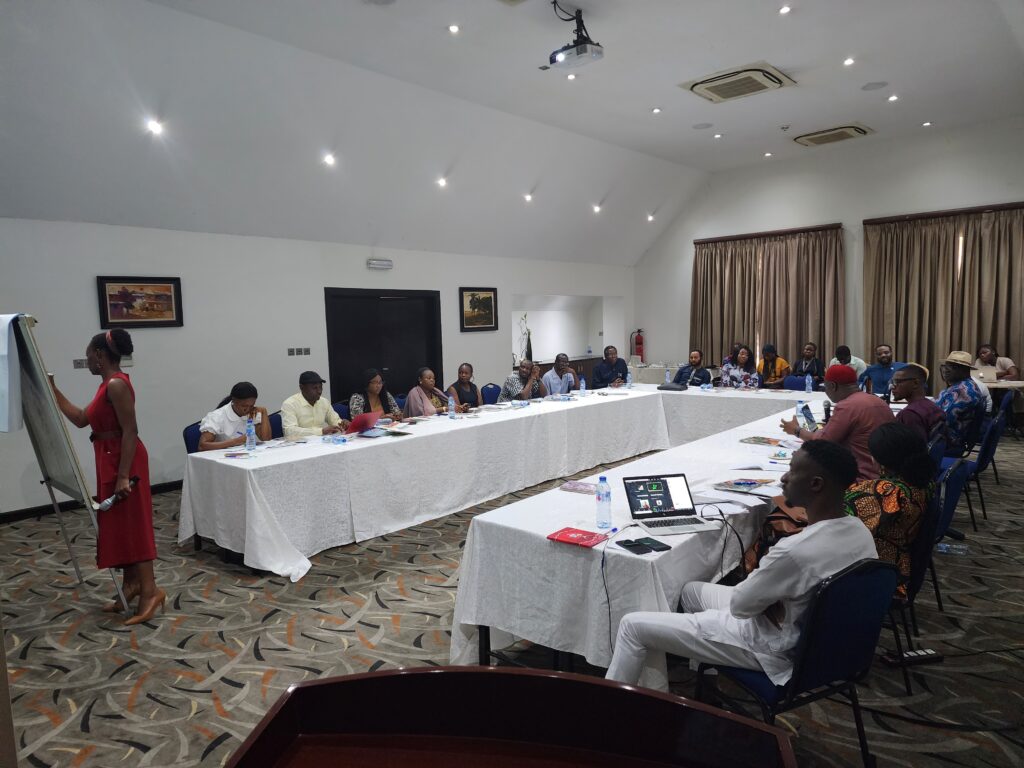Spaces for Change | S4C partnered with the Natural Resource Governance Institute (NRGI) to co-host a roundtable on December 8 & 9, 2022, where 25 participants comprising technical experts on gas, civil society leaders, and environmental justice advocates assessed the infrastructure and governance risks to Nigeria’s gas sector optimization plans and the planned use of gas as a transition fuel. NGRI’s Senior Officer, Ms. Tengi Ikoli affirmed that the dialogue forms part of a broader strategy to set up a consortium of experts on gas within the civil society and media to monitor and track government policies and plans on gas, and also lead sustained advocacy campaigns towards greater transparency, accountability in the gas sector. S4C’s Communication Officer, Sefa Ikpa, reiterated the importance of integrating community perspectives in national discourses around gas development.
Paper presentations by NRGI Senior Officers titled ‘Gas in Nigeria’s Energy Transition: Stranded Assets/Infrastructure’ examined the choice and role of gas in Nigeria’s energy transition. Gas became a choice of transition fuel for Nigeria taking into account the need for decarbonization, energy security, replacement of declining oil revenues, industrialization, and economic diversification, etc. While utilizing gas primarily for cooking, exports, electricity, and industries will be prioritized, financing and sourcing are still major challenges. In this connection, prioritizing bankable brown gas projects due to the shrinking global financing for fossil fuel projects is imperative. In addition, moribund laws and policies need to be fast-tracked to speed the implementation of the Petroleum Industry Act (PIA).
The second presentation shared the findings from S4C’s research, Natural Resource and Benefit-sharing Negotiations Between Host Communities and Extractive Companies: A Case Study of Assa North and Ohaji South [ANOH] Gas Development Project. This research examined the issues faced by gas-rich communities during the negotiation of costs and benefits with corporations. Lands used for gas projects continued to acquired without due process and adequate conpemsation, giving rise to violent land disputes. Also, extractive companies use divide-and-rule tactics, ignoring the existing traditional institutions when engaging communities, which breeds suspicion and mistrust. To make matters worse, agreements between corporations and communities popularly known as general memorandum of understanding (GMOUs) are unilaterally drafted by extractive companies, giving communities little or no room to articulate their own needs and priorities in such agreements. Steps must be taken to address these social concerns so that they are not carried over to the new decade of gas. Major gas projects like the ANOH gas development project will not be stranded for at least 30 years. It is, therefore, important to address the lingering issue of asymmetrical relationships between host communities and extractive companies.
The two presentations stirred debates and group discussions around many issues around improving technical knowledge of local stakeholders impacted by gas deals, amendment of the PIA for a clearer role and definition of host communities, decommissioning and abandonment strategies and possible job losses that may emanate from the transition. In light of the long-term energy security proposals that are heavily anchored on the use of natural gas, how much have gas-rich communities contributed to the development of Nigeria’s energy transition plan? These and many more top the issues that dominated the discussions. Particpants resolved to increase their vigilance on national gas and policies. In addition, curbing gas flaring must be kept at the frontburner of the transition agenda, accompanied by increased investments in gas infrastructure development.





















